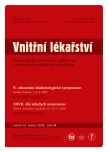-
Medical journals
- Career
Education of diabetic patients with chronic kidney disease and after transplantation
Authors: A. Jirkovská
Authors‘ workplace: Centrum diabetologie IKEM Praha, přednostka prof. MUDr. Terezie Pelikánová, DrSc.
Published in: Vnitř Lék 2008; 54(5): 530-534
Category:
Předneseno na 9. celostátním diabetologickém sympoziu „Diabetes a urogenitální systém“ ve dnech 1.-2. června 2007 v Novém Adalbertinu v Hradci Králové
Overview
Despite recent advances in the management of diabetes, diabetic nephropathy is the most frequent cause of end-stage renal disease. Even when diabetic nephropathy is established, patient’s care should be optimized to delay progression of nephropathy or other diabetic complications. Evidence exists for the effectiveness of diet intervention, blood pressure and diabetes control and treatment of metabolic syndrome. We emphasize the need for closer co-operation not only between diabetologists, primary care physicians and nephrologists, but with educated diabetic patients, too. At referral to nephrologist, many patients’ care is suboptimal and referral is too late. The most important education information for patients is to stick to diet and keep adequate blood pressure and diabetes control with self - monitoring. Effectiveness of each of these recommendations is critically assessed. Patients after kidney or combined kidney and pancreas transplantation have to be educated mainly in symptoms of rejection and diabetic foot care. They are recommended to take regularly the prescribed medicines, to distinguish the adverse events of immunosuppression and keep all doctor´s appointments.
Key words:
diabetic nephropathy - education - self-monitoring
Sources
1. Dunn EJ, Burton CJ, Feest TG. The care of patients with diabetic nephropathy: audit, feedback, and improvement. Q J Med 1999; 92 : 443-449.
2. Jirkovská A et al. Jak (si) léčit a kontrolovat diabetes. Praha: Svaz diabetiků 2003.
3. AAFP patient education. Diabetic nephropathy - information from your family doctor. American Family Physician 2005; 72: AAFP Home Page.
4. Diabetes Nutrition Study Group of the EASD. Evidence-based nutritional approaches to the treatment and prevention of diabetes mellitus. Nutr Metab Cardiovasc Dis 2004; 14 : 373-394.
5. Thorp MI. Diabetic nephropathy: common questions. Am Fam Physician 2005; 72 : 96-99.
6. Mancia G, Facchetti R, Bombelli M et al. Long-term risk of mortality associated with selective and combined elevation in office, home, and ambulatory blood pressure. Hypertension 2006; 47 : 846-853.
7. Dart RA. The clinical utility of patient-measured blood pressure at home in the management of hypertension. Clin Med Res 2005; 3 : 134-136.
8. McManus RJ, Mant J, Oakes RA. Targets and self monitoring in hypertension: randomised controlled trial and cost effectiveness analysis. BMJ 2005; 331 : 493-496.
9. Welschen L, Bloemendal E, Nijpels G et al. Self-monitoring of blood glucose in patients with Type 2 diabetes who are not using insulin. Diabetes Care 2005; 28 : 1510-1516.
10. Davis W, Bruce DG, Davis TM. Is self-monitoring of blood glucose appropriate for all Type 2 diabetic patients? Diabetes Care 2006; 29 : 1764-1770.
11. Heisler M, Smith DM, Hayward RA et al. How well do patients´ assessments of their diabetes self-management correlate with actual glycemic control and receipt of recommended diabetes services? Diabetes Care 2003; 26 : 738-743.
12. Thorn LM, Forsblom C, Fagerudd J et al. Metabolic syndrome in Type 1 diabetes. Association with diabetic nephropathy and glycaemic control. Diabetes Care 2006; 28 : 2019-2024.
13. Fored CM, Ejerblad E, Fryzek J et al. Socio-economic status and chronic renal failure: a population-based case-control study in Sweden. Nephrol Dial Transplant 2003; 18 : 82-88.
14. Saudek F. Příprava na transplantaci. Praha: Maxdorf 2005.
Labels
Diabetology Endocrinology Internal medicine
Article was published inInternal Medicine

2008 Issue 5-
All articles in this issue
- Haemocoagulation and renal insufficiency, haemocoagulation and type 2 diabetes mellitus
- Urologic surgery in diabetes
- Tumours of kidneys, urinary bladder and prostate in obesity and diabetes
- Bariatric surgery and the kidneys
- System rennin-aldosterone in fat tissue and other organ and tissues
- Diabetes, dyslipidaemia and kidney diseases
- Specific issues of dialysed diabetics in outpatient practice
- Specific aspects of peritoneal dialysis in diabetic patients
- Education of diabetic patients with chronic kidney disease and after transplantation
- Metformin and kidneys
- The use of organ specific substrates in kidney disease in a diabetic patient
- Nutrition for the diabetic patient with kidney disease
- Mucosal immunity with emphasise on urinary tract immunity and diabetes
- Visceral diabetic neuropathy of the urogenital tract
- Erectile dysfunction, its relation to diabetes and its management in 2007
- Epidemiology of diabetic nephropathy
- Examination of the kidneys in a diabetic patient
- Diabetes mellitus, hypertension and kidney
- Internal Medicine
- Journal archive
- Current issue
- Online only
- About the journal
Most read in this issue- Metformin and kidneys
- Haemocoagulation and renal insufficiency, haemocoagulation and type 2 diabetes mellitus
- Specific issues of dialysed diabetics in outpatient practice
- Examination of the kidneys in a diabetic patient
Login#ADS_BOTTOM_SCRIPTS#Forgotten passwordEnter the email address that you registered with. We will send you instructions on how to set a new password.
- Career

